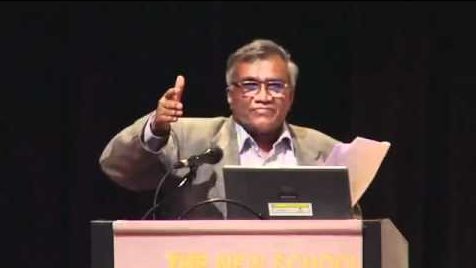
Gopal Guru’s Ethics in Ambedkar’s Critique of Gandhi: An Exercise in Rhetoric
Gopal Guru is an erudite scholar and a political scientist of high reputation. His command over political theories is a sign of his scholarship. However, the above-mentioned essay lacks erudition and academic neutrality. His language is full of clichés and oftentimes meanders to become illegible and confusing. The essay in question is one such piece of his writings that has no set goal in sight. His intention is difficult to judge, but one of his sentences may give us the hint of his intention: All three (Gandhi-Ambedkar-Gopal Guru) of our futures are linked up with the transformation of social relations in India. He wants to become part of history. By saying this, he (perhaps) intends to say that his essay is an exercise in social transformation.
Gopal Guru undertakes to transform the attitude of the followers of Babasaheb Ambedkar towards Gandhi. He criticises the followers of Babasaheb Ambedkar for inflicting cognitive injustice on Gandhi. He slams the followers of Babasaheb Ambedkar for reducing his thoughts to mere formalism. He castigates them for their “selective reading” of Gandhi. He finds faults with Babasaheb Ambedkar’s biographer for misinformation. During this overall cognitive castigation (or should we say violence) of Ambedkarites, he absolves himself by putting himself on the same pedestal of Gandhi and Ambedkar, as his quest for cognitive generosity. He plays a blame game but argues that his essay is an exercise in reconciliation.
A lot is written about Gandhi and his relation with untouchability. Gandhi’s views and methods of the social transformation were diametrically opposed to Babasaheb Ambedkar’s views and methods of social transformation. For Gandhi, the annihilation of caste was never a goal. He was the ardent supporter of the Varnashrama Dharma. Babasaheb Ambedkar refuted Gandhian theory of social transformation based on spiritual-political interpretation of Brahminical texts, which he saw as more legitimate than the rights of the untouchables to enter public places (in this case, the temple at Vaikom). Gandhi’s quest was outright political and blended with “Hindu” religion which he largely derived from his own reading and interpretation of Gita. While Babasaheb Ambedkar’s quest was the liberation of human beings, which he saw absent in the Gita. He completely deconstructed Gita and its teachings. Gandhi upheld the supremacy of the shashtras (Vedic brahminical texts), while Babasaheb Ambedkar repudiated these very texts as the foundation of caste-based social order.
Gandhi’s early writings like “Hind Swaraj” mentions nothing about the practice of untouchability. As the supporter of Jajmani system, Gandhi was a supporter of the caste-based system of economic exploitation. Babasaheb Ambedkar was the ardent supporter of democracy and was against any hierarchy in society.
Babasaheb Ambedkar was the master persuader and he had highly developed skills in convincing people, but Gandhi was never at the centre of his persuasion. His methods of persuasion combined many tools and were directed at many constituencies. It was directed at liberating his people from the slavery of the caste Hindus after 1935 when he realised the orthodoxy of caste Hindus. He went after Gandhi only when he saw that Gandhi was opposed to the civil and political rights of his people during the Round Table Conferences (RTCs). His interest in Gandhi was peripheral and contingent upon his fight for justice for his own people. Gandhi and his influence are long dead in India. But Gopal Guru insists on reviving Gandhi among the followers of Babasaheb Ambedkar. It raises many questions as he stipulates nothing in Gandhi that the followers of Babasaheb Ambedkar can learn from in their quest for liberation. Gandhi miserably failed to change the “hearts” of caste Hindus. Gandhi wanted to use the untouchable to further his political project of Ram Rajya. It is evident from his priorities. He did not undertake annihilation of untouchability and annihilation caste as his primary goal.
The political rise of the untouchables forced Gandhi to use methods of co-option and theatrical dramas to bring the untouchables in the Congress fold. Besides the power of persuasion, Babasaheb Ambedkar had political maturity and intelligence to upset the political equation of the caste Hindus. He forced Gandhi and Congress to factor in the untouchables in their political equation. Gandhi and Congress tried every trick to stop the untouchables to become a separate political class. It is perhaps time for Gopal Guru to show what followers of Babasaheb Ambedkar can learn from Gandhi, or else he will be counted among those who disown their own people to get recognition for their “cognitive honesty” from others.
Author – Mangesh Dahiwale, Human Rights Activist




I had the opportunity to read Mangesh Dahiwale’s response to Mr. Gopal Guru’s article.Mr.Guru’s crtitcism of Ambekriter’s was not correct in his scholarly lingo,”Cognitive injustice”.I don’t know what that means.Any how I am not a scholar of any body, however,Whatever I have read about Dr.Ambedkar tell me that Gandhi was upholder of “Chatur Varna Dharma” .This was his life.He lived for it, as a Marwari Bania, how can any body expect him to denounce caste hierarchy.Gandhi has his own ideas of the entire Hindu philosophy.On the contrary Dr.Ambedkar has modern thinking, with modern education among the best brains of the world. There is No match compare Gandhi and Dr.Ambedkar. on many serious issue, Dr.Ambedkar’s books are enough to blast Gandhi ideas which are now dead force.His ideas are on artificial respirator by upper caste Hindus. Mangesh is a dedicate Ambedkarite,I have know his work for decades, a man with impeccable record. as a Human Rights activist.Mr. Guru needs to re-read Dr.Ambedkar .
Brilliantly articulated. This happens when the uncontrollable desire to get one’ existence validated by those who hold power becomes the structuring principle for one’s vocation.